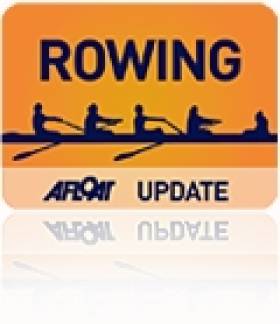Displaying items by tag: Heads
Last of National Rowing Heads takes place in Belfast Today
There are 148 crews over the three races starting with pairs and sculls, then doubles and fours and finishing in the afternoon with eights and quads. The third race features 35 eights and 26 quads.
The big race of the day, the men's senior eights, which starts at 3.45 pm, will feature a high intensity race between the two Queen's University eights. The A Queen's crew, with new strokeman, Mike Ewing, have been relatively the same crew for the last three years. This is the crew which mounted serious challenges to the victorious NUIG team at the Irish Rowing Championships, narrowly missing out on a national senior eight by a mere few feet on two occasions. The A team's Ewing won a Wyfold cup (men's coxless four) at Henley last year.
The women's intermediate eights should prove interesting with a crew entered from St Andrews in Scotland who will be up against Queen's University Ladies and St Michael's, Limerick.
The men's junior 16 eights sees all the Ulster crews up against each other whilst the men's junior 18 quads sees Blackrock College, Dublin, Shandon ,Limerick and Offaly Rowing Club take on the Ulster schools.
Eight crews will contest the men's Master's pennant (over 28s) with Galway, Bann and Athlone pushing the Belfast-based masters crews, Belfast Boat Club, Belfast Rowing Club and the Lady Victoria Boat Club, all the way. The former Queen's ladies rower ,Frenchwoman Solange Garrais is bringing a men's Masters and a women's Masters quad from Aviron Grenoblois, France to compete.
The 10.45 am and 13.15 pm races start at the Albert Bridge in Belfast and finish at Queen's boathouse at Stranmillis. The 15.45 pm race starts at the Odyssey building in Belfast Harbour and finishes at Queen's boathouse at Stranmillis. There are viewing points along the full length of each race.
The official start to the regatta season takes place on Saturday 2nd April with the Neptune regatta at Islandbridge, Dublin.
Click this link for Irish Rowing detailsClick this link for the Latest Rowing News






























































